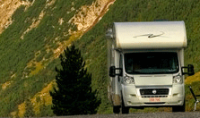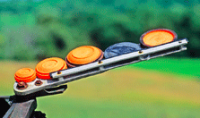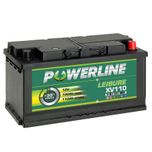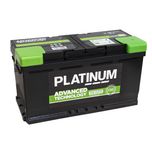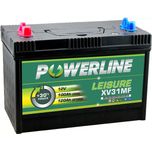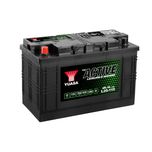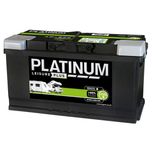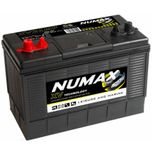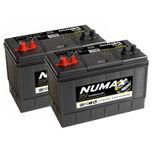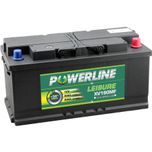Leisure Batteries

Leisure Batteries from the world's top manufacturers
Your leisure battery is the heart of your caravan or motorhome's electrical system. The battery powers everything from your simple on-board lighting to your fridge freezer or even a motor mover. Keeping your battery healthy is vital for trouble-free leisure time. We stock all major brands of leisure battery from the like of Varta to Exide and Yuasa; as well as our own hand-picked Powerline and Enduroline ranges. We suggest reading our many customer reviews to assist you in finding a great battery for your requirements.
Our huge range of leisure batteries comes in all shapes and sizes so you can be sure that we will have more than one battery that is suitable for your application. We have leisure batteries in stock now, ready to be despatched with next day delivery to your home or work! If you need some help or advice on which leisure battery is right for you, please get in touch!
(60 Reviews)
£96.21
(178 Reviews)
£122.29
(437 Reviews)
£89.18
(184 Reviews)
£112.72
(153 Reviews)
£103.57
(1292 Reviews)
£106.41
Pair of Numax CXV31MF Sealed Leisure Marine Batteries
I orderd replacements for my power boat renovation. I use Numax currently and they have been installed for 8+ years. So I am looking forward to similar reliability from these replacements. Tayna are a great company to deal with and provide a fast delivery service with a reputable carrier. Thanks Tayna Team. Regards John

JH - Glossop, United Kingdom -
XV190MF Powerline Leisure Battery 12V
Good battery. Excellent service. I always buy batteries from Tayna

SR - Kings Lynn , United Kingdom -
L35-115 Yuasa Active Leisure Marine Battery 12V 115Ah
Good make of battery at a great price. Arrived within 2 days of ordering. No issues.

TP - Somerset, United Kingdom -
XV110 Powerline Dual Purpose Leisure Battery 12V 110Ah
I have 3 of these serving a solar instalation on a boat in an off grid location and performance has been excellent so far. They also have sufficient cranking amps to start small marine engines so a good all round battery at a great price with a reassuring 4 year guarantee

GW - London, United Kingdom -
What is a Leisure Battery?
Your leisure battery is the heart of your caravan, motorhome or campervan's electrical system. If your leisure battery is underperforming, your whole electrical system will underperform. We suggest that should perform an annual check of your battery to ensure that it's in tip top condition.
The battery will power many aspects of your mobile home; from lights and television to fridge freezers to name just a few. If you have a motor mover, the 12V battery will be the power source for this too. The last thing you want is for a peaceful break to be ruined by a failing battery.
How to choose a Leisure Battery
When choosing a battery there are a few important considerations. The first being the physical space available. Always measure the area that the battery will live. Whether this be the caravan/motorhome battery box, or in other cases the area under the seat. You need to ensure that the battery you choose will fit into this space.
Next, you need to consider terminal type and polarity. Most leisure batteries have standard SAE (car type) terminal posts, but some other have a bolt type connection. In some cases the wiring requires that the positive terminal must be on either the right or left hand side. Ensure that the battery you look for matches this specification.
Now you want to look at the power rating. The battery capacity is the measure of how much energy the battery can hold and is measured in AH (amp hours). In short, the larger the number the longer the battery will last between charges. Strangely, the capacity of a battery can change depending on how fast the current is drawn from it so you will see different scales such as C20 or C100. A measurement of 100Ah at C20 (sometimes referred to as 20 hours) means that the battery should theoretically provide constant 5 Amps if discharged over 20 hours (100/20 = 5). A measurement of 100Ah at C100 would mean that the battery should theoretically provide a constant 1 Amp if discharged over 100 hours (100/100 = 1). Always check to ensure that you are comparing the same scale, as a 100Ah battery rated at C20 could be as high as 130Ah rated at C100.
Finally, if you have a motor mover we suggest looking for a battery with a high CCA value. This is 'cold cranking current' and is the measure of how much energy the battery can provide in one push. Unlike most other onboard electronics, a motormover is a high drain device so you need a lot of power in a short period. Traditional leisure batteries didn't quote a CCA value, but the introduction of motor movers has meant that most manufacturers now provide this value.
Do I need a Deep Cycle Leisure Battery?
The term Deep Cycle is traditionally used in industrial applications for battery such as the excellent Trojan Battery range. In brief; a deep cycle battery is a battery that is able to be very discharged and then recharged over and over many times. You may think that all batteries should be made to be this way, but the vast majority of leisure batteries don't have this requirement. Many campers use electric hookup or in the case of motorhomes, they will be driving daily with the alternator charging the battery. In these cases, the battery is rarely particularly discharged so the extra costs involved in the production of a deep cycle battery would not be justified.



































